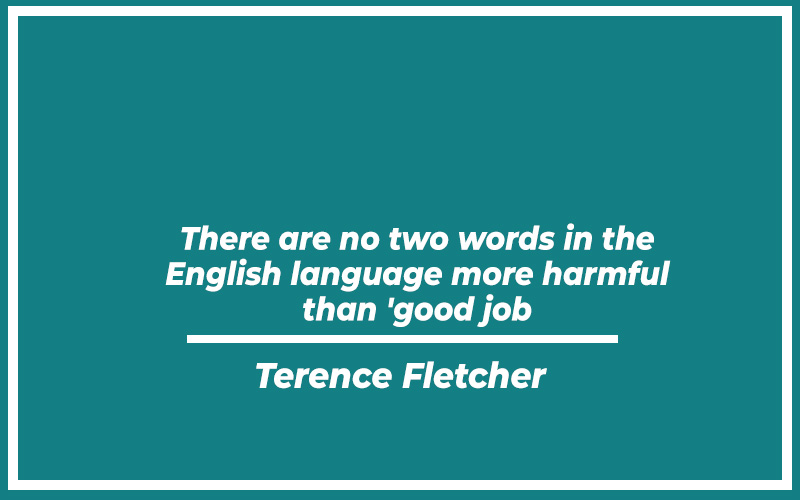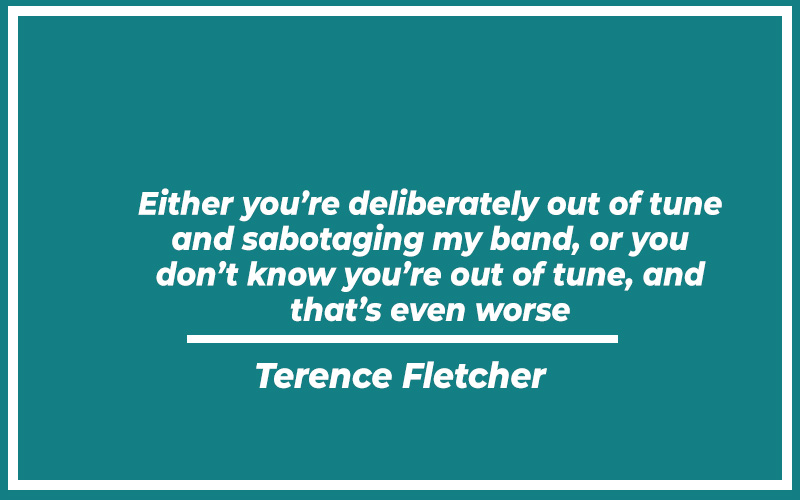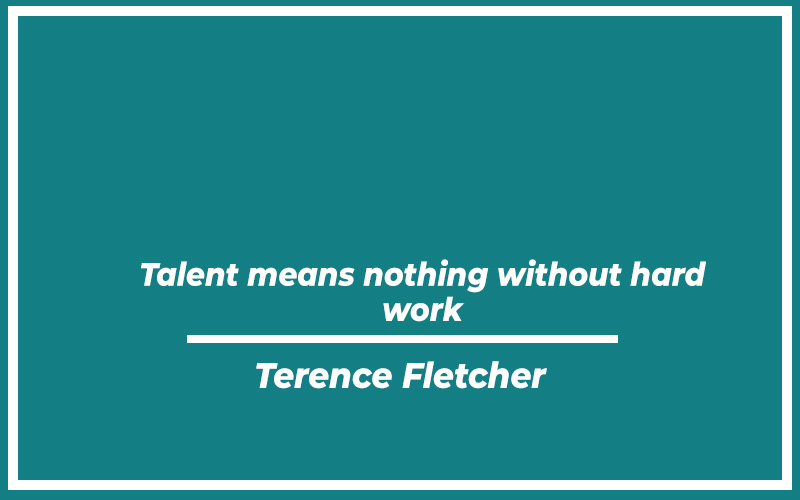Have you ever watched Whiplash and found yourself captivated by its intense dialogue and raw emotions? The quotes from this film are unforgettable—they hit you hard, just like the relentless rhythm of a drumbeat.
Whether it’s the harsh words of Terence Fletcher or Andrew’s relentless determination, these lines resonate with anyone who’s ever pushed themselves to the edge in pursuit of greatness.
When you hear these quotes, they make you think about ambition, sacrifice, and what it really takes to reach the top.
Best Whiplash Quotes

“There are no two words in the English language more harmful than ‘good job.'” – Terence Fletcher
In “Whiplash,” Terence Fletcher’s assertion underscores his belief that complacency hinders excellence. By labeling “good job” as detrimental, he challenges the notion of settling for adequacy, advocating instead for relentless pursuit of perfection. This perspective raises ethical questions about motivational methods, as Fletcher’s extreme tactics blur the line between encouragement and abuse.
The quote invites reflection on the balance between positive reinforcement and the drive for improvement, highlighting the complexities in nurturing talent without causing harm.
Also Read: Top Lash Quotes (with Explanation)
“I was there to push people beyond what’s expected of them. I believe that’s an absolute necessity.” – Terence Fletcher
Fletcher’s philosophy emphasizes pushing individuals past their perceived limits to achieve greatness. He views this approach as essential for uncovering true potential. However, his methods, often harsh and unyielding, spark debate about the ethical boundaries of mentorship.
This quote prompts consideration of the fine line between constructive challenge and detrimental pressure, questioning how far one should go in the pursuit of excellence and the potential consequences of such an approach on individuals’ well-being.
“If you want the f**ing part, earn it!”* – Terence Fletcher
Fletcher’s blunt directive to Andrew underscores his belief in meritocracy and the necessity of proving oneself through hard work. This statement reflects his uncompromising standards and the high expectations he sets for his students.
It serves as a catalyst for Andrew’s intense dedication and relentless practice, highlighting the pressures faced by those striving for success in competitive environments. The quote encapsulates the film’s exploration of ambition, discipline, and the sacrifices made in the quest for greatness.
“Not quite my tempo.” – Terence Fletcher
This recurring line from Fletcher signifies his meticulous attention to detail and demand for precision. It reflects his intolerance for anything less than perfection and serves as a subtle yet powerful critique of Andrew’s performance.
The phrase becomes emblematic of the constant pressure to meet Fletcher’s exacting standards, illustrating the psychological strain placed on students. It highlights the theme of the relentless pursuit of excellence and the toll it can take on individuals striving to meet such high expectations.
“I’d rather die drunk, broke at 34 and have people at a dinner table talk about me than live to be rich and sober at 90 and nobody remembered who I was.” – Andrew Neiman
Andrew’s declaration reveals his intense desire for lasting recognition and his willingness to sacrifice personal well-being for artistic immortality. This perspective underscores the film’s exploration of ambition and the lengths individuals will go to achieve greatness.
It raises questions about the cost of success and the value placed on legacy versus personal happiness. Andrew’s statement reflects the internal conflict between the pursuit of excellence and the potential personal sacrifices involved.
“The next Charlie Parker would never be discouraged.” – Terence Fletcher
Fletcher uses this assertion to justify his harsh teaching methods, suggesting that true prodigies would persevere regardless of obstacles. This perspective implies that only those with exceptional resilience and talent will succeed, potentially dismissing the emotional well-being of students.
It raises ethical considerations about the responsibility of mentors to support their students’ mental health while fostering talent. The quote challenges the notion of whether greatness requires enduring extreme adversity or if supportive guidance can also cultivate exceptional abilities.
“Now, are you a rusher, or are you a dragger, or are you gonna be on my f**ing time?”* – Terence Fletcher
Fletcher’s confrontational question to Andrew during a rehearsal highlights his obsession with timing and precision. It serves as a metaphor for the broader expectations he has for his students to align perfectly with his standards.
The intense scrutiny and pressure encapsulated in this moment reflect the film’s exploration of the demands placed on aspiring artists and the psychological impact of such relentless expectations. The quote underscores the theme of control and the struggle for autonomy within the mentor-student dynamic.
“The key is to just relax. Don’t worry about the numbers. Don’t worry about what the other guys are thinking. You’re here for a reason.” – Terence Fletcher
This quote reflects Fletcher’s attempt to instill confidence, albeit briefly, before diving into his usual demanding methods. He acknowledges the importance of self-belief amidst intense competition, even though his approach often undermines such reassurance.
The quote encourages focus on one’s unique abilities and purpose, rather than external validation. It highlights the delicate balance between pressure and encouragement, showing Fletcher’s rare moments of humanity. This message is crucial in reminding individuals to find their inner calm and self-assurance even in high-stakes environments.
“If you deliberately sabotage my band, I will gut you like a pig.” – Terence Fletcher
This line showcases Fletcher’s intense, unforgiving demeanor. His harsh language highlights the immense pressure he puts on his students to maintain perfection in the band. The quote raises questions about the ethics of using fear as a motivational tool and its psychological toll.
Fletcher’s threatening approach exemplifies the extremes of his drive for excellence, drawing attention to the darker side of ambition. While it might inspire results, it also risks damaging relationships and emotional well-being, provoking debates about the cost of success under such conditions.
“You earned the part. Alternates, clean the blood off my drum set.” – Terence Fletcher
This quote exemplifies Fletcher’s brutal humor and unwavering commitment to discipline. By acknowledging a student’s success while making a macabre comment, Fletcher establishes his high standards while maintaining his intimidating persona. The mention of “blood” alludes to the physical and emotional sacrifices required in the pursuit of excellence.
It serves as a reminder of the intense environment Fletcher fosters and the toll it takes on those striving to meet his expectations. The scene underlines the theme of the grueling path toward achievement and the sacrifices involved.
“We’ll start now. Five, six, and…” – Terence Fletcher
This phrase is deceptively simple but indicative of Fletcher’s authoritative control over the band. It symbolizes the beginning of relentless critique and his relentless quest for perfection. Fletcher’s ability to command attention with such minimal words showcases his dominance and the unspoken pressure he exerts.
It also encapsulates the structured yet unpredictable environment he creates, where students must remain hyper-alert. The line is a subtle reminder of the rigid discipline required to excel in a competitive, high-pressure setting.
“Were you rushing, or were you dragging?” – Terence Fletcher
This iconic question encapsulates Fletcher’s obsession with timing and precision. His demand for perfection leaves no room for error, intensifying the psychological pressure on his students. It reflects the film’s broader exploration of the balance between precision and passion, and the consequences of rigidly pursuing excellence.
The scene highlights the lengths Fletcher goes to in creating a controlled environment, while also exposing the mental strain his methods place on individuals. The question invites reflection on the price of perfection and the fine line between encouragement and torment.
“If you think Caravaggio was a good painter, don’t get me started on your drumming.” – Terence Fletcher
Here, Fletcher dismisses Andrew’s efforts while referencing art history, blending sarcasm with his critiques. This line illustrates Fletcher’s talent for cutting down students’ confidence to push them harder. By setting impossibly high standards, he continually challenges his students, but often at the expense of their self-esteem.
The quote raises the issue of whether such brutal honesty fosters growth or damages creativity. Fletcher’s harshness serves as a metaphor for the relentless pursuit of greatness, where subjective judgments can either inspire or devastate.
“Get out of my sight before I demolish you.” – Terence Fletcher
This line epitomizes Fletcher’s volatile temper and zero-tolerance policy for mediocrity. His language reflects the immense pressure he places on students to meet his expectations. The intensity of this statement also highlights the toxic environment he creates, where failure is met with hostility rather than constructive feedback.
It prompts reflection on the long-term effects of such harsh mentorship, questioning whether the ends justify the means. The scene captures the relentless nature of Fletcher’s teaching style and the toll it takes on those subjected to it.
“I don’t think people understood what it was I was doing at Shaffer. I wasn’t there to conduct. Any f**ing moron can wave his arms and keep people in tempo. I was there to push people beyond what’s expected of them. I believe that is… an absolute necessity.”* – Terence Fletcher
Fletcher’s philosophy revolves around pushing students beyond conventional limits, which he views as essential for achieving greatness. His dismissal of traditional conducting as mere timekeeping reflects his belief that true mentorship involves relentless challenges. This perspective highlights the film’s exploration of ambition, talent cultivation, and the ethical boundaries of teaching methods.
While Fletcher’s intentions might aim at excellence, his unrelenting methods question whether the end justifies the means. The quote invites reflection on how far a mentor should push without causing emotional harm, illustrating the delicate balance in fostering greatness responsibly.

“Either you’re deliberately out of tune and sabotaging my band, or you don’t know you’re out of tune, and that’s even worse.” – Terence Fletcher
This ultimatum reflects Fletcher’s zero-tolerance policy for imperfection and his disdain for ignorance of one’s flaws. By forcing students to confront their shortcomings, he fosters a high-pressure environment where mistakes are unacceptable. The psychological impact of such an approach pushes students to scrutinize themselves intensely, but it can also instill fear and insecurity.
This quote underscores Fletcher’s demanding teaching style and the toll it takes on his students, highlighting the film’s central theme of whether relentless critique is the best way to achieve excellence or a damaging form of control.
“For the record, Metz wasn’t out of tune. You were, Erickson, but he didn’t know, and that’s bad enough.” – Terence Fletcher
Here, Fletcher uses deception to teach a harsh lesson about awareness and accountability. His tactic demonstrates the extreme measures he takes to instill discipline, emphasizing self-awareness as a vital skill for success. However, his manipulative approach raises ethical questions about the impact of such methods on students’ trust and morale.
This moment illustrates Fletcher’s obsession with precision and control, showing how his methods prioritize results over emotional well-being. The quote invites reflection on whether such extremes are necessary or harmful in nurturing talent and fostering growth.
“We have a squeaker today, class. His name is Andrew Nieman, he’s 19 years old. Isn’t he cute?” – Terence Fletcher
This sarcastic remark belittles Andrew, establishing Fletcher’s dominance and creating a power dynamic that keeps students on edge. By undermining Andrew’s confidence in front of his peers, Fletcher fosters a climate of fear and competition. The quote reflects Fletcher’s manipulative tactics, which aim to test resilience but risk emotional harm.
This moment highlights the film’s exploration of the psychological cost of mentorship, raising questions about the balance between constructive critique and destructive behavior. Fletcher’s methods push boundaries, showing the toll of high-pressure environments on aspiring artists.
“Not quite my tempo.” – Terence Fletcher
This recurring critique symbolizes Fletcher’s obsession with perfection and precision. While seemingly subtle, the phrase carries immense weight, driving Andrew to strive for absolute alignment with Fletcher’s expectations. It becomes emblematic of the constant pressure faced by students, illustrating the fine line between high standards and psychological strain.
The quote reflects Fletcher’s meticulous nature and the toll his unrelenting demands take on his students. It highlights the film’s broader theme of the sacrifices and struggles inherent in the pursuit of excellence, questioning the cost of achieving greatness.
“The drumsticks are just tools. It’s you who’s special.” – Terence Fletcher
This quote emphasizes the personal responsibility and innate talent required to excel, rather than reliance on external tools. Fletcher acknowledges that greatness comes from within, though his teaching methods rarely reflect this sentiment. It serves as a rare moment where Fletcher appears to inspire rather than intimidate.
This statement encourages Andrew to see his potential and to take ownership of his success, though it also underlines the intense individual pressure Fletcher places on his students. It captures the balance between empowerment and the overwhelming expectations Fletcher often demands.
“Andrew, if you want to be great, greatness takes sacrifice.” – Terence Fletcher
Here, Fletcher bluntly articulates one of the film’s main themes: the sacrifices required to achieve greatness. This line resonates with Andrew’s journey, as he continuously compromises relationships, well-being, and personal happiness in his pursuit of excellence.
Fletcher’s statement prompts reflection on the nature of ambition and the costs associated with it. It raises questions about whether the rewards of success justify the sacrifices made along the way and whether a mentor’s role should include fostering balance rather than pushing individuals to extremes.
“That’s your idea of an apology? Pathetic.” – Terence Fletcher
This line demonstrates Fletcher’s refusal to accept half-hearted attempts at reconciliation or effort. It reflects his unyielding standards, not only for musical performance but also for accountability and personal growth. Fletcher’s critique highlights his belief in sincerity and dedication as critical components of success.
While his methods are harsh, this quote speaks to the importance of authenticity and commitment in all aspects of life. It also reinforces the psychological pressure he places on his students, driving them to confront their vulnerabilities head-on.
“You think that’s good enough? Try harder.” – Terence Fletcher
Fletcher’s relentless push for improvement is encapsulated in this line. His insistence that “good enough” is never sufficient reflects his belief that only through continuous effort can one achieve greatness. While this mindset can inspire determination, it also risks instilling self-doubt and burnout in students.
The quote exemplifies Fletcher’s controversial teaching philosophy, which prioritizes results over mental well-being. It invites reflection on the role of perseverance in success and the balance between striving for improvement and accepting one’s limitations.
“The best musicians are the ones who can perform under pressure.” – Terence Fletcher
Fletcher’s philosophy centers around the ability to thrive in high-pressure environments. This quote encapsulates his belief that enduring and overcoming stress is integral to achieving excellence. Fletcher’s methods are designed to simulate intense pressure, forcing his students to either adapt or fail.
While this perspective may prepare students for the realities of competitive industries, it also raises questions about the long-term effects of such an approach. The quote highlights the film’s exploration of resilience, ambition, and the psychological toll of relentless pressure.
“There’s no room for mistakes in my band.” – Terence Fletcher
This uncompromising declaration underscores Fletcher’s intolerance for imperfection. It reflects the high stakes he sets for his students, where even minor errors are met with severe consequences. While this attitude fosters a sense of discipline and precision, it also creates an environment of fear and anxiety.
The quote challenges the notion of whether such rigid expectations are necessary for excellence or whether they stifle creativity and growth. It illustrates the film’s central conflict between the pursuit of perfection and the emotional cost of achieving it.
“This isn’t about talent. It’s about how far you’re willing to go.” – Terence Fletcher
Fletcher shifts the focus from innate ability to perseverance and dedication in this statement. He emphasizes that success is achieved not solely through talent but through relentless effort and sacrifice. This quote encapsulates the film’s exploration of ambition, discipline, and the lengths one must go to achieve greatness.
It challenges the audience to consider the value of hard work versus natural ability and raises questions about the limits of endurance in the face of extreme demands. It’s a pivotal reminder of Fletcher’s philosophy that greatness is forged through unrelenting struggle.
“You’re here for a reason. Don’t waste it.” – Terence Fletcher
This quote serves as a rare moment of encouragement from Fletcher, reminding Andrew of his potential and purpose. It reflects Fletcher’s belief in his students’ abilities, though it’s delivered within the framework of his high-pressure expectations.
The statement highlights the responsibility placed on Andrew to justify his position in the band and to strive for excellence. While motivational, it also adds to the weight of Fletcher’s demands, reminding Andrew of the stakes involved. The quote captures the duality of mentorship, blending inspiration with the immense pressure to succeed.

“Talent means nothing without hard work.” – Terence Fletcher
This quote encapsulates Fletcher’s core belief that innate ability is meaningless without relentless effort and discipline. It serves as a driving force behind his intense teaching methods, pushing students to go beyond relying on their natural gifts.
While Fletcher’s philosophy emphasizes perseverance, the quote also underscores the film’s exploration of the balance between nurturing talent and demanding perfection. It prompts reflection on whether hard work alone can justify the extreme sacrifices Fletcher expects, raising questions about the ethical boundaries of mentorship and the true cost of success.
Also Read: Mother’s Day in Heaven Quotes (with Explanation)
Final Thoughts
So, when you reflect on Whiplash quotes, let them challenge you to think about your own limits and aspirations. These aren’t just movie lines; they’re thought-provoking statements about the price of success and the complexity of human drive.
Whether they inspire you to push harder or remind you to strike a balance, these quotes stay with you, echoing like the final note of a powerful performance.
Let them motivate you to reflect on your own journey and what greatness means to you.

